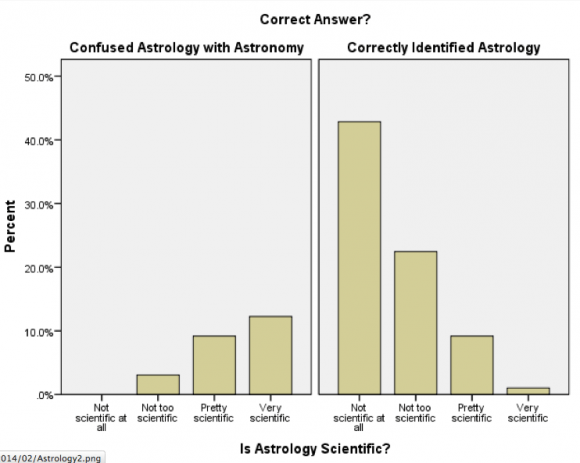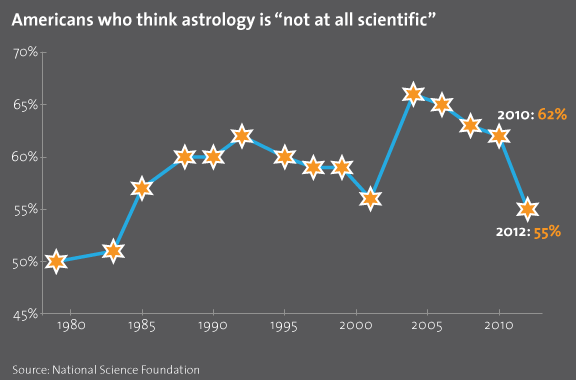Every Thanksgiving when I was home from college, at least one family member would turn to me and ask me how that astrology degree was going, or tell me about a new astrology article they read. It wasn’t that my family members really thought I was studying astrology or even believed astrology was scientific, it was just that they mixed up “astronomy” with “astrology.” In all fairness, for those who don’t follow either astrology or astronomy very closely, it might be considered an honest mistake.
So when a report from the National Science Foundation claimed a majority of young Americans believed astrology was scientific I had my doubts. But so did psychologist, Richard Landers from Old Dominion University who performed a small second study and found the report to be biased.
Since 1979, NSF surveys have asked Americans whether they view astrology — the study of how the movement of celestial bodies affects the here and now — as being scientific.
Their most recent survey showed that nearly half of all Americans (42 percent) believe astrology to be scientific. But what’s more alarming, according to the NSF, is that American understandings of science are moving in the wrong direction. It seems our golden year was in 2004, when 66 percent of Americans said astrology was not at all scientific. That number has been dropping ever since.
It should come as no surprise that those with a higher education are more willing to demote astrology entirely. In 2012, 72 percent of those with graduate degrees indicated that astrology is not scientific, compared with only 34 percent of those who didn’t graduate high school.
Shockingly, age was also related to perceptions of astrology. Younger respondents (ages 18-24) seemed to give astrology a high vote of confidence,with only 42 percent claiming that it isn’t scientific. So roughly six in every 10 young adults believe astrology is absolutely scientific.
But such dramatic conclusions are being drawn from a single question: “Is astrology scientific?” It’s based on the crucial assumption that people are correctly interpreting the word “astrology.”
Landers guessed that the survey respondents might be mixing up the term “astrology” with “astronomy.” So he performed a quick survey himself, using Amazon Mechanical Turk (MTurk) — a crowdsourcing internet marketplace. He collected 100 responses to a survey that asked three questions:
— Please define astrology in 25 words or less.
— Do you believe astrology to be scientific?
— What is your highest level of education completed?
His initial assessment — without taking into account how the respondent defined astrology — showed results very similar to the original survey provided by the NSF — approximately 30 percent found astrology to be scientific. While this percentage is less than what the NSF report found, Landers believes this is due to a user bias (MTurk users tend to be more educated and older than the average American).
But once Landers included the answer to the first question into his results, he saw a very clear trend: those who defined astrology correctly did not believe it to be scientific, while those who confused astrology with astronomy did believe it to be scientific.

Among those that correctly identified astrology, only 13.5 percent found it to be “pretty scientific.” And only one person found it to be “very scientific.” Among those that confused astrology with astronomy, the discipline was overwhelmingly seen as scientific.
“My little quick study doesn’t ‘overturn’ the NSF results” Landers told Universe Today. “It only suggests that the NSF results are probably biased to some degree.”
With such small number statistics Landers certainly didn’t prove the NSF results wrong, but he does call the study into question. Landers also noted an additional study from the European Commission which corroborated his findings.
I for one would love to see the NSF conduct a more detailed study. Including a definition of astrology in the next round of surveys would certainly bring clarification and shed light on the root of the problem.
—
Update: After posting this article, a reader informed me of a critique of Richard landers’ assessment, posted by The Washington Post’s Jim Lindgren. He conducted another follow-up study to explore the issue. In his own sample, Lindgren found that probably only one respondent out of 108 confused “astrology” with “astronomy.” He claims it’s unlikely the NSF report was biased at all.
However, the back and forth banter between experts suggests these words and their corresponding definitions do need to be clarified. Science journalists have their work cut out for them.


But that’s exactly the problem isn’t it? Not necessarily that an increasing number of people think astrology is as scientific as astronomy, but that an increasing number of people don’t know the difference.
I can’t count the number of times that someone, a family member, friend, neighbor or passer-by started talking astrology when I mentioned astronomy or tended an eyepiece. Usually they start by blathering on about their sign or talk about something they heard on the radio or internet about some weird ‘end of the world’ event via planetary/cometary/black hole/time warp theory. OR the UFO they swear they saw…. These are the ‘one ups’ who always have a re-joiner like “BUT, DID you hear about (The Midnight Rambler~) …?” crowd. They are so proud to be able to bring new information to the table that they are willing to make it up right there on the spot! One up syndrome? I usually just say, ” Not astrology, Astronomy and Science!” THAT simple statement always raises the hackles of the true believers! Oopsy… Big Difference… vociferous defenders of the ‘faith’ insist astrology works, at least in their experience, which they usually have plenty of…. “Say… WHAT sign are you anyway? I’ll bet you are a Leo or an Aries… No.. you’re a Taurus, right?” I tell them… “No, my Mexican friends back in the 70’s when I lived in Southern California, told me my sign. They said I was a Feces. So, I’ll have to stick with that!” ~@; P
The bad thing is that traditionally astrology has enjoyed much better EPO than astronomy, thanks to newspaper and magazine columns (and those little rolls of paper they used to sell in convenience stores with the cool rotating-drum displays.) They should have been selling printed pictures from Voyager.
I’m more ok with the public confusing astrology and astronomy than I am with half the country thinking the correct definition of astrology IS scientific.
On a personal level, if someone confuses the two with me, they’re asking for a free science lesson. The only person I’ll let talk to me about astrology is my wife’s 83-year old grandmother… just because I know there’s no changing her mind.
…or the person I talked to recently who thought “cosmology” referred to women’s make-up.
It is very embarrassing…!
It is obvious that it is a function of economic situation (making living)… Both of the tendencies go to same direction, like quantum entanglement…!
Another question that ought to be asked is: “Do you follow astrology to help you with decision making?” And compare these responses with the rest of them.
Now that’s a good question.
How many people here use astronomy to help with decisions? I do.
When should I drag out the telescope?… when I should sit out in the cold watching for meteors?… when is there a possibility of Aurora? ect… 😉